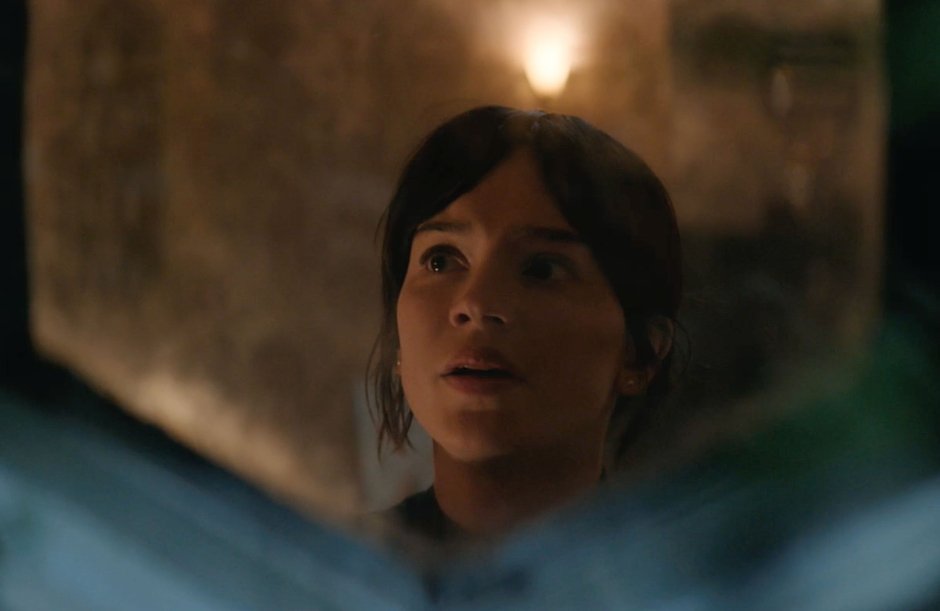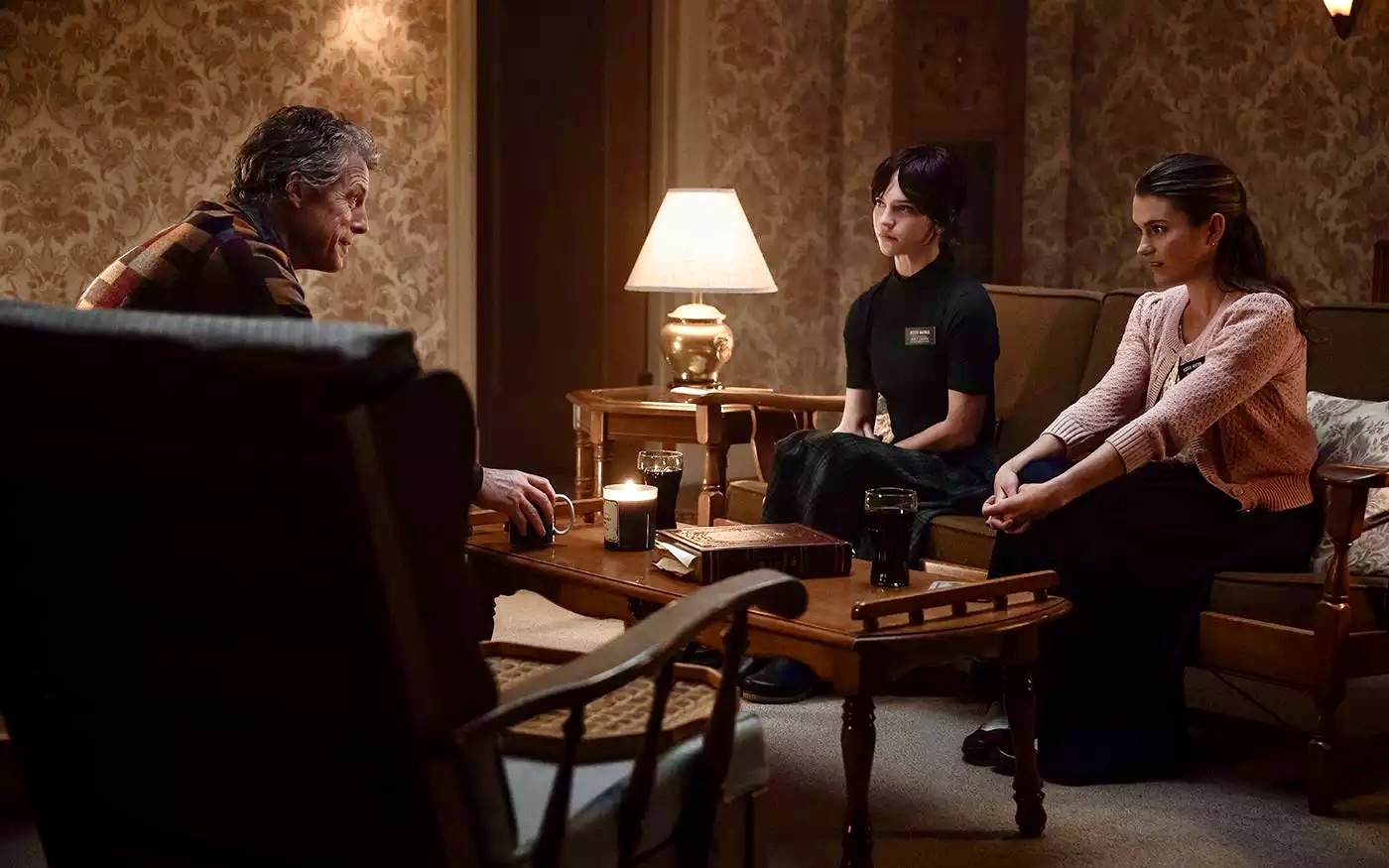This week, “The Heretic” starring Hugh Grant was released in Russian cinemas, a horror thriller that brought unexpected depth and intellectual tension to the genre.
Why might it be interesting to the viewer? Because this is not just another horror film with predictable jump scares, but a thoughtful work about faith, belief and human nature. Anything unusual? Yes. This is what we love and watch.
We watched the new film and are ready to share our emotions. Spoiler alert – we were expecting a completely different horror film.
This is an unusual horror film, and it’s great.
What is the film about?: Two missionaries from The Church of Jesus Christ of Latter-day Saints go door to door looking for new people to bring to their church. A seemingly routine visit ends at the home of Mr. Reed, a charming man who happily invites the girls inside with the promise that his wife will soon bring blueberry pie.
But what begins as a casual conversation about religion quickly escalates into a dark psychological game that questions their faith and reason.
The film raises difficult questions: Why do people believe? Is this a conscious choice or the result of upbringing? The main antagonist dissects dogma with encyclopedic precision, putting the heroines in front of complex moral and spiritual dilemmas.
Religious debates are presented through metaphors and examples that are easy for the viewer to understand. This approach keeps the film fresh within the genre. Unlike typical horror films, where religion is presented through stereotypes like possession or exorcisms, The Heretic discusses the very essence of faith. This can be both an interesting challenge for the viewer and a turn-off for those looking for light, entertaining gore content.
The film does not rely on standard horror techniques. There are no rivers of blood or sharp screamers here. Instead, horror is built on ideas. This movie is scary because it makes the viewer think about their own beliefs. However, the film’s intellectual depth may be a dealbreaker for those accustomed to more traditional action-packed plots with straightforward developments.
Hugh Grant played one of the best roles of his career

Hugh Grant, once associated exclusively with charming romantic leads in films such as Notting Hill and Love Actually, has made a dramatic turnaround in his career in recent years.
He has proven that he is capable of going beyond his role, turning into a multi-faceted chameleon actor. Suffice it to recall his role in “The Gentlemen.”
Mr. Reed is more than just a villain. His character is multi-layered: he is both charming and sinister, intelligent and crazy. From the very beginning of the film, Reed comes across as a good-natured old man in a cozy cardigan, who is happy to welcome guests and treat them to blueberry pie.
However, behind this smile lies cold, calculating manipulatorready to use his mind as a weapon.
Hugh Grant masterfully balances between these states. His Reed is either sincere and endearing, or he makes you tremble with his subtle hints and hidden threat. This transformation occurs so smoothly that the viewer, like the heroines, does not have time to realize when friendliness turns into tyranny.

Grant demonstrates excellent command of words. His character uses virtually no physical force, but his dialogue is a real intellectual arsenal. Reed methodically destroys the heroines’ beliefs, starting with innocent questions and ending with philosophical provocations. Tarantino would approve!
His transition from a harmless gentleman to a psychological tormentor is not just acting, but a real transformation that keeps the viewer in suspense until the very end. This is one of the most memorable and profound roles of his career.
The other two actresses do a good job in their roles. The heroines complement each other – one is more reserved and suspicious, the second is naive at first, but changes as the plot progresses, which is interesting to watch.
The visuals complement the unusual plot

In The Heretic, visual style plays a key role in helping to convey the depth and uniqueness of the story. This is not just a background for events, but a full-fledged tool that enhances the atmosphere of the film, emphasizes its philosophical ideas and creates a feeling of anxiety.
Each frame is carefully crafted to reflect the characters’ inner conflict, adding to the claustrophobia and tension that pervade the film.
The main location of the film: the house of Mr. Reed (Hugh Grant). At first glance, this is a cozy space: soft lighting, wooden furniture, candles that create a feeling of warmth. But this comfort quickly turns into growing horror. As the missionaries begin to realize their trap, the house reveals its hidden facets: narrow corridors, closed doors and tiny windows turn it into a labyrinth.
This visual metaphor perfectly reflects Reed’s own character. His home is like a projection of his mind: outwardly he is good-natured and calm, but inside lies chaos, sophistication and composure.
You may not like the film due to its originality

Usually, when people talk about a film’s shortcomings, they mean clichéd plot lines, bad acting, or trivial script errors. But in the case of Heretic, the main reason for the possible disappointment of the audience is its originality.
This film pushes the boundaries of traditional horror to offer something unique – and that’s what might be a deal breaker for those looking for familiar genre elements.
Most viewers who choose horror are accustomed to a certain set: sharp jump scares, intense chases, supernatural creatures, rivers of blood, mountains of meat. The Heretic goes against those expectations. Instead of scaring the viewer with visual tricks, it makes you think.
The horror here is not in the ghosts or blood, but in the dialogue, ideas and philosophical dilemmas.
The film is more reminiscent of an intellectual duel than a standard thriller. This approach is refreshing to the genre, but for fans of classic horror it may seem too slow or too talky.
Another risky aspect of the film is its central theme. Religion is typically used in horror through familiar tropes: exorcisms, demons, possession. Here a different perspective is offered, immersing the viewer in a discussion about the nature of faith, its role in human life and its influence on the individual.
For viewers who are far from issues of faith, such topics may seem too heavy or simply uninteresting. The philosophical dialogues, although thoughtful, can be perceived as drawn out.
If you go to the cinema for dynamics, the new product may disappoint.
The film asks many questions, but not all of them are answered. A viewer who expects release or climactic horror from a horror film may be left disappointed.
The ending of the film, although interesting, does not reach the level of tension that was established at the beginning and middle of the story. It’s not a failure, but it does leave you feeling like the film could have done a little more.
This is horror for thinking viewers
“The Heretic” is a bold experiment in horror that goes beyond traditional plots and offers an intelligent approach to fear. It is ideal for those who are looking for something new and are ready to plunge into dark philosophical reflections.
However, for fans of fast-paced and traditional horror films, it may be a challenge.
If you want to feel like you’re part of a dialogue about the meaning of faith and doubt, The Heretic is definitely worth your time. If you’re looking for light entertainment with the usual scary elements, this film probably won’t live up to your expectations.
Source: www.iphones.ru


